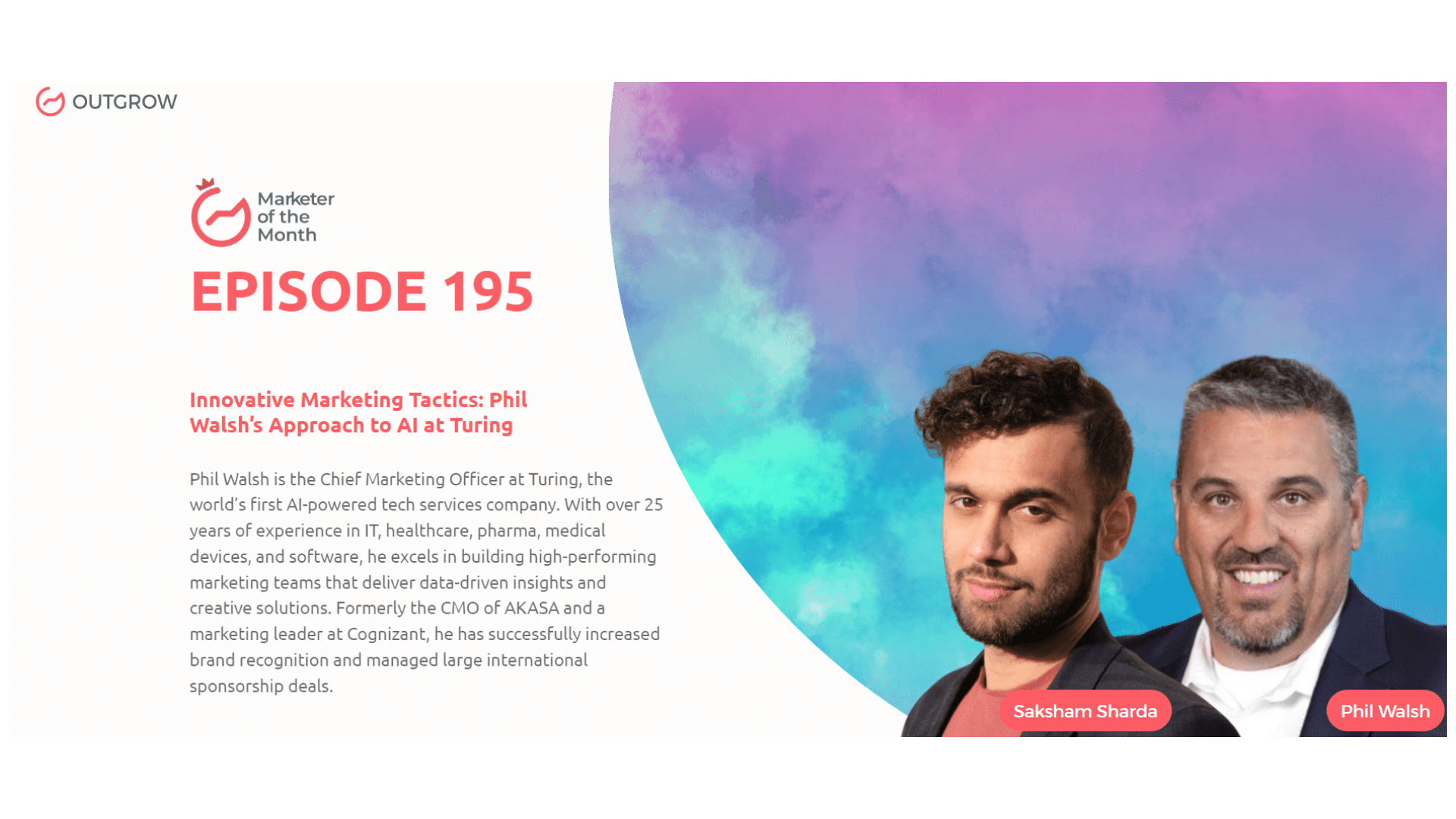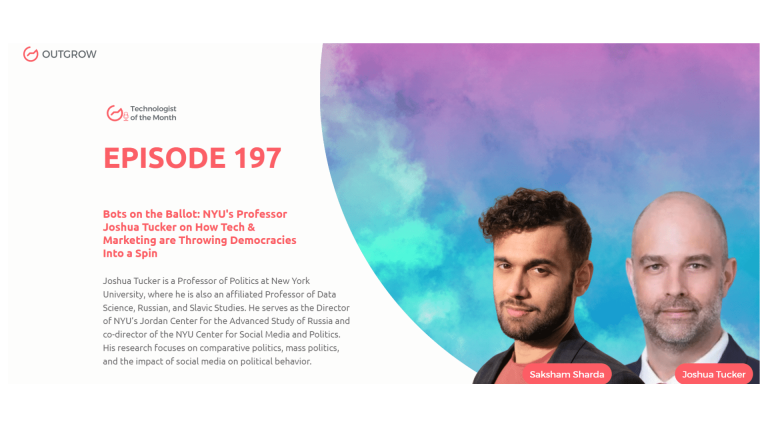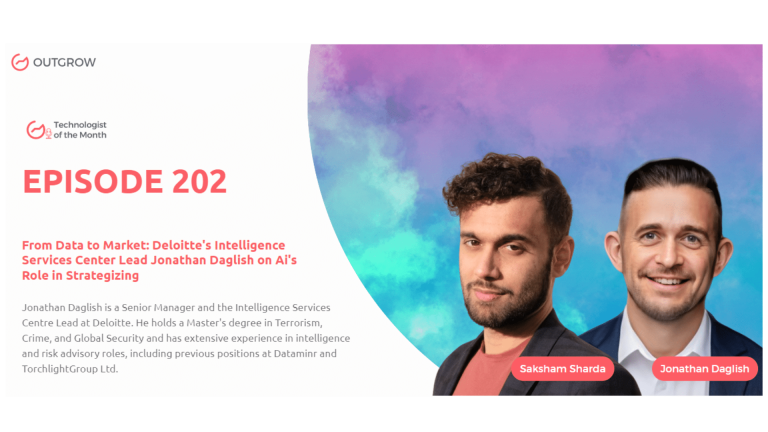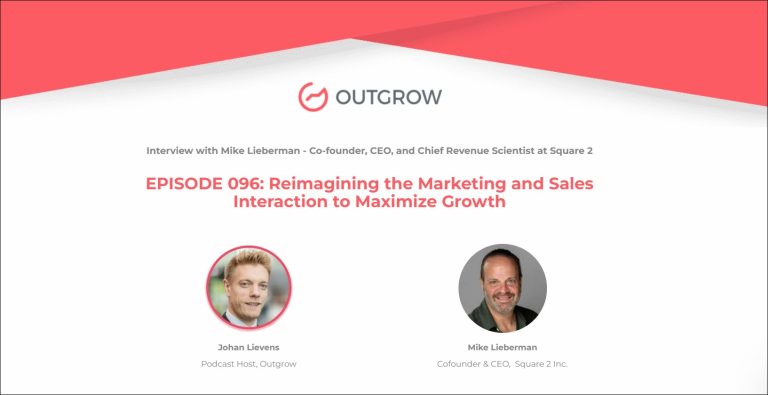EPISODE 195: Marketer of the Month Podcast with Phil Walsh
Table of Contents
Hey there! Welcome to the Marketer Of The Month blog!
We recently interviewed Phil Walsh for our monthly podcast – ‘Marketer of the Month’! We had some amazing insightful conversations with Phil and here’s what we discussed about –
1. The transition from traditional tech and AI startup to Turing’s AI-driven services.
2. AI as a tool to augment and enhance human potential and productivity.
3. Leveraging global talent pools for faster and more effective solutions.
4. Emphasis on brand, product marketing, communications, and marketing operations.
5. Ensuring marketing strategies align with client needs and stages in the journey.
6. Combining digital strategies with personal, relationship-building events.
About our host:
Dr. Saksham Sharda is the Chief Information Officer at Outgrow.co. He specializes in data collection, analysis, filtering, and transfer by means of widgets and applets. Interactive, cultural, and trending widgets designed by him have been featured on TrendHunter, Alibaba, ProductHunt, New York Marketing Association, FactoryBerlin, Digimarcon Silicon Valley, and at The European Affiliate Summit.
About our guest:
Phil Walsh is the Chief Marketing Officer at Turing, the world’s first AI-powered tech services company. With over 25 years of experience in IT, healthcare, pharma, medical devices, and software, he excels in building high-performing marketing teams that deliver data-driven insights and creative solutions. Formerly the CMO of AKASA and a marketing leader at Cognizant, he has successfully increased brand recognition and managed large international sponsorship deals.
Innovative Marketing Tactics: Phil Walsh’s Approach to AI at Turing
The Intro!
Saksham Sharda: Hi, everyone. Welcome to another episode of Outgrow’s Marketer of the Month. I’m your host, Dr. Saksham Sharda, and I’m the creative director at Outgrow. co. And for this month we are going to interview Phil Walsh who is the Chief Marketing Officer of Turing.
Phil Walsh: Great to be here. Thank you.
Don’t have time to read? No problem, just watch the Podcast!
Challenge yourself with this trivia about the exciting topics Phil Walsh covered in the podcast.
Or you can just listen to it on Spotify!
The Rapid Fire Round!
Saksham Sharda: Alright, so let’s start with the rapid-fire round. So the first question is, at what age do you want to retire?
Phil Walsh: 55.
Saksham Sharda: Okay. How long does it take you to get ready in the mornings?
Phil Walsh: Oh wow. 20-25 minutes.
Saksham Sharda: Okay, you have to talk to the lens and not,
Phil Walsh: Okay. 25 minutes.
Saksham Sharda: Most embarrassing moment of your life.
Phil Walsh: As a teenager, I got hit in the sensitive parts with a ski pole in front of my entire senior class. Very embarrassing.
Saksham Sharda: Favorite color?
Phil Walsh: Blue.
Saksham Sharda: What time of day are you most inspired?
Phil Walsh: 10:00 PM
Saksham Sharda: How many hours of sleep in survival?
Phil Walsh: Six.
Saksham Sharda: Fill in the blank. An upcoming marketing trend is ____.
Phil Walsh: AI.
Saksham Sharda: The city in which the best kiss of your life happened.
Phil Walsh: Rome.
Saksham Sharda: Pick one Mark Zuckerberg or Elon Musk.
Phil Walsh: Musk.
Saksham Sharda: The biggest mistake of your career?
Phil Walsh: I passed on joining Genentech in the early, early days. I would’ve been retired. Retired long ago.
Saksham Sharda: How do you relax?
Phil Walsh: Golfing.
Saksham Sharda: How many cups of coffee do you drink per day?
Phil Walsh: Zero. I don’t drink coffee.
Saksham Sharda: The most valuable skill you’ve learned in life.
Phil Walsh: Life, creating human relationships.
Saksham Sharda: Your favorite Netflix show.
Phil Walsh: Well, I don’t know if it’s, I don’t know if it’s on Netflix, but I’ll go with Ted Lasso.
Saksham Sharda: The last film that had a good impression on you,
Phil Walsh: I don’t know if it’s the last one, but Shawshank Redemption is one that always has a lasting impression on me.
Saksham Sharda: The last song you’ve been listening to,
Phil Walsh: I’m a country music fan, so anything country.
Saksham Sharda: So that’s the end of the rapid fire. So you can take so with the longer questions, take as ease and time to answer them.
Phil Walsh: Okay.
The Big Questions!
Saksham Sharda: So, We’re gonna start with the first one. What drew you to Turing and what is the team trying to achieve that you’re most excited about?
Phil Walsh: Yeah, when Turing approached me about joining the organization, I thought it was a really good fit for me, not only at the time of where I was in my career, but I’d spent quite a lot of time in traditional tech services. And then the past 18 months were with an AI startup and I felt like Turing was a great mix of the two traditional tech services being disrupted by an AI native player, but also because Turing was already well established. They had a marketing arm, they were looking to go from good to great. Those are the things that appeal to me for sure. I’m really lucky that I’m inheriting a great marketing team. Some world-class talent. It’s a little bit fractured today. So marketing lives in three or four different areas within the organization. So my job is to come in and pull them together, build one cohesive strategy, align the team to really work to achieve our goals as Turing transitions from really being this kind of transactional marketer that was going after anybody who wanted to raise their hand to have a conversation to more of a journey based, nurturing, growing, building a brand, creating great content.
Phil Walsh: That’s something I have a passion for and excited to roll that out at Turing.
Saksham Sharda: How did you develop your passion for branding in the first place?
Phil Walsh: Well, I think it’s more than branding, right? I started my career in sales and sales management. So we have that love-hate relationship with sales and marketing and as I sat on the side of sales looking at what good marketing was or wasn’t happening, that’s how I transitioned, into the marketing side. As I look at my marketing philosophy, while the brand is massively important to the long-term success of the company, if you’re not in tune with the clients’ needs, what they’re looking for, and their concerns, it’s really hard to build one demand. But two, that brand that resonates with clients on the backend.
Saksham Sharda: So as a CMO of an AI tech startup, what is your big-picture perspective on the impact of AI in the consulting services industry? And how do Turingofferings align with this vision?
Phil Walsh: Yeah, great question. I think, so we believe a tour that AI is gonna unleash human potential, right? And what that means is not that AI is here to replace people’s jobs, but AI is here to augment people’s jobs and to make them more effective in their roles. And in today’s world, we believe in boundaryless work. So something that you don’t have to be in an office or in the tech services world, large campuses across the world, you can be just as effective from your home office in Lisbon or in Dallas or in Tokyo. And having an AI platform that will vet you, analyze your ability to do the work, and then more importantly match you to the work that needs to be done. And then we augment that with tools that can help you be more effective and more productive in your work. We believe that AI will transform tech services, and disrupt the traditional model, and as companies are forced to embrace AI, they’re gonna look for those companies that are AI native and have proven experience building on an AI platform to help them guide them through their journey. And that’s really what Turing is well-positioned to do.
Saksham Sharda: So how does your AI-powered Talent cloud address the challenges and limitations that were prevalent in traditional tech and how does it differ from other solutions in the market?
Phil Walsh: Sure. So traditionally tech services were based on, you would pick a vendor who had large groups of talents positioned on certain campuses around the world. A lot of that tended to be in India. And so you were relying on the quality of the talent in that location or with that vendor. And those vendors did a lot to develop talent, right? So they would go into universities, pull people directly into universities, invest in them, and grow them, but it was sort of based on one philosophy or one thinking. The talent cloud now allows us to pull anybody from anywhere around the world. There are 27 million software developers out there, data engineers, and data scientists, some of them are in Africa, some of them, and a lot of them are in Latin America, and Eastern Europe, right? Not the traditional tech centers of Silicon Valley or New York City or campuses in India. So the talent cloud, by being able to leverage a global talent pool, allows you to use AI to vet and find the best of the best talent. It allows you to go much quicker and with a higher velocity. So in some cases, we can deploy talent in a matter of days, whereas a traditional model may have been weeks or months. You can interview in real-time, or you may not, you may even be able to skip the interview process because you can look at how AI has vetted, and graded, the talent. You can look at the code that they’ve been able to create in real-time and evaluate that, not having to do just based on what their resume may have said they’ve done in the past. And then thirdly, it’s about, and it’s always gonna be about how we solve clients’ problems. So it’s one thing to have a talent pool, it’s another thing to actually deliver real outcomes for our clients. And so the way Turing is working whether it’s one developer that you need or an entire team of developers that you need, it’s always about what are we doing to change or improve the end client’s outcomes, right? Whether that’s helping them with their AI strategy, developing apps, migrating to the cloud, whatever it may be. If we don’t put that client’s end result first, then we’ll never be successful.
Saksham Sharda: And so as a CMO, what will be your key areas of focus within Turing’s marketing organization, including brand product, marketing, communications, and marketing operations?
Phil Walsh: I’m intentional as I’m coming in now a month into being the CMO of making sure I’m taking my time to truly evaluate the team’s strengths and areas of opportunities. There are a couple of things that we will deploy no matter what I’m a big believer in, especially in enterprise marketing, that there’s a journey that has to exist, right? I don’t believe a CIO of a Fortune 500 company is gonna Google something, land on a page, and fill out a form. They have to be taken through a journey, right? And so as a marketing organization, we want to build that journey. We want to be measuring and tracking that journey. So leveraging marketing technology to do that, understanding what’s happening at every stage of the journey, and providing the next best steps for our prospects as they’re going through that journey. But it’s not just digital, right? I think stats show that 67% of the journey is digital. Before you talk to somebody, you have to build in strategic activation events, whether it’s conferences like this, whether it’s small intimate dinners or client events, whether it is relationship networking, building opportunities to get to know folks for the humans that they are not just the IP address or the device ID that we’re tracking digitally. It’s that combination of everything that has to happen. It’s working very closely with our sales organizations to be able to activate these folks along the way, know when they’re ready to have a conversation, and know where they are in their journey. So we’re providing relevant content at that stage, right? If somebody’s in the early stage of the buying journey, we don’t want to be providing bottom-of-the-funnel content. If somebody’s much further along the journey, I don’t necessarily need them to read a blog post about our brand. I want them to be looking at our solutions and our case studies and our video testimonials as they’re furthered along that buying journey.
Saksham Sharda: So with the increasing adoption of AI in various industries, what do you believe are the major industry shifts that Turing can capitalize on and differentiate itself in the tech services landscape?
Phil Walsh: Yeah, great question. So specifically within AI, there are a couple of different areas. I think it’s automating repetitive work as staffing issues are prevalent across the world, right? As the folks that traditionally had been doing the repetitive work, bringing in smart robotics to help automate is certainly an area that we can focus on for sure. The second one is gathering, aggregating, and making decisions with data. So a lot of our clients have spent the last 5, 7, and 10 years in their digital transformation journey, building data lakes, and gathering data. Now we can help them apply AI to that data so they can make real business decisions in real-time, and start doing predictive analytics. And then the third thing would be capitalizing on the GPT craze, right? How do we leverage these AI tools for the production of content, for the synthesis of information, right? That type of strategy. Those are probably the three areas today that are the low-hanging fruit for us for sure.
Saksham Sharda: And how do you plan to stay ahead of the club in ensuring Turing remains at the forefront of this AI-driven technology service?
Phil Walsh: Well, we have a lot of really smart people who work for Turing for sure. Not only as an employee, but we have to leverage our talent cloud and the developers and data scientists, and engineers that are in that talent cloud. They’re at the forefront of this transformation, making sure we have good two-way communication to pull information from them so that we can aggregate it ourselves. We have to be present at conferences like these where cutting-edge conversations are happening, thought leaders are on stage. Our CEO is speaking a lot. Our two co-founders are very well-versed in AI, have built careers in AI, and have studied at some of the best universities in the world around AI and machine learning. So leveraging them, for me as a marketer, it’s about creating thought leadership content that we can leverage. We want our clients to know us, not only for great execution and for helping them solve problems, but to be thinking about what’s next. How do I get ahead of how I stay in front of the changing and evolving trends, right? AI changes are daily. So making sure that Turing is seen as somebody at the forefront of that evolution is important to us as a brand.
Saksham Sharda: Alright, so the last question for you is of a personal kind. What would you be doing in your life, if not this?
Phil Walsh: Well, I think everyone has a dream. I would love to be a professional golfer. I don’t have the golf game to do that, but I think that would be a dream of mine for sure. I think the other piece would be teaching, right? Going back to university. I was never trained formally as a marketer. My degree is actually in biology. I thought I was going to be a physician. So I’ve built my career, I did an MBA midway through my career, but I built my career on life lessons and how to take some of what isn’t taught in a book and apply that or pass that knowledge on to the next generation of marketers would be something I’d be interested in doing.
Let’s Conclude!
Saksham Sharda: Thanks, everyone for joining us for this month’s episode of Outgrow’s Marketer of the Month. That was Phil Walsh who is the Chief Marketing Officer of Turing.
Phil Walsh: Pleasure. Thanks for having me.
Saksham Sharda: Check out the website for more details and we’ll see you once again next month with another marketer of the month.

Muskan is a Marketing Analyst at Outgrow. She is working on multiple areas of marketing. On her days off though, she loves exploring new cafes, drinking coffee, and catching up with friends.








